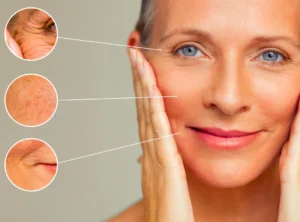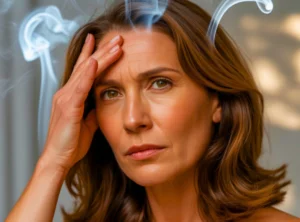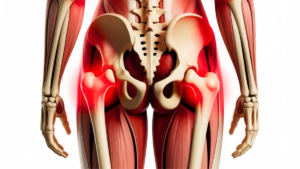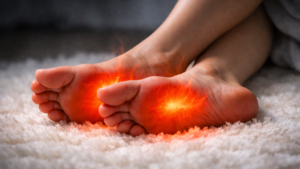Are you experiencing a significant change in your skin after turning 45? Do you wonder if it’s just a natural part of aging or if there’s more to it?
For many women, menopause brings about a range of physical and emotional transformations. The decrease in estrogen levels can lead to skin issues such as thinning, sagging, and wrinkling.
As women navigate this significant life phase, it’s essential to understand the impact of hormonal changes on their body, particularly their skin.
The Menopausal Transition: What Happens After 45
The menopausal transition, which often starts around the age of 45, is characterized by substantial hormonal shifts and bodily changes. This natural biological process marks the end of a woman’s reproductive period and is associated with various physical changes.
Hormonal Shifts and Their Impact on the Body
During menopause, the body undergoes significant hormonal changes, primarily the decrease in estrogen levels. This reduction affects various bodily functions and leads to symptoms such as hot flashes, mood swings, and changes in skin and hair.
The decrease in estrogen is particularly impactful on the skin, as it plays a crucial role in maintaining skin elasticity and hydration. As estrogen levels drop, women may notice their skin becoming drier and less elastic.
Timeline of Physical Changes
The physical changes associated with menopause do not occur overnight; they unfold over a period of time. Initially, women may experience changes in their menstrual cycle, followed by symptoms like night sweats and hot flashes.
As menopause progresses, the reduction in collagen production becomes more pronounced, leading to sagging skin and wrinkles. Understanding this timeline can help women prepare for and manage these changes more effectively.
How Menopause Affects Your Skin
The onset of menopause triggers a series of hormonal shifts that impact skin health. During this transition, the body undergoes various changes that can significantly affect the skin’s appearance and health.
Collagen Depletion and Elasticity Loss
One of the primary concerns during menopause is the depletion of collagen, a crucial protein that gives skin its strength and elasticity. As collagen production decreases, the skin starts to sag and wrinkle, leading to a loss of its youthful appearance. This reduction in collagen, coupled with the loss of elasticity, makes the skin more prone to rugas or wrinkles.
Dryness, Thinning, and Sensitivity Issues
Menopause also leads to dryness and thinning of the skin due to the decrease in estrogen levels. This hormonal change causes the skin to become drier, more sensitive, and thinner, making it more susceptible to irritation and less capable of retaining moisture. As a result, women may experience increased sensitivity and a higher risk of skin conditions during this period.
Menopause and Wrinkles - How to Deal with This Aging Process?

As women navigate menopause, they often find themselves dealing with the unwelcome signs of aging, particularly wrinkles. The decrease in estrogen levels during menopause affects the skin, leading to dryness, thinning, and a loss of elasticity, which in turn causes wrinkles. Understanding how to manage these changes is crucial for maintaining healthy, youthful-looking skin.
Daily Skincare Essentials for Menopausal Skin
A consistent skincare routine is vital during menopause. Using a creamy cleanser and moisturizer can help hydrate the skin, reducing the appearance of fine lines and wrinkles. It’s also essential to protect the skin from the sun by using a broad-spectrum sunscreen daily.
Incorporating products with retinol or peptides into your skincare routine can be beneficial. These ingredients help in promoting collagen production and improving skin elasticity, thereby reducing wrinkles.
Targeted Treatments for Different Types of Wrinkles
Different types of wrinkles require targeted treatments. For instance, dynamic wrinkles, which are caused by muscle movements, can be treated with botulinum toxin injections. On the other hand, static wrinkles, which are visible even when the face is at rest, may require fillers or chemical peels to reduce their appearance.
Using products containing hyaluronic acid or glycolic acid can also help in minimizing wrinkles by keeping the skin hydrated and promoting cell turnover.
Addressing Muscle Tone and Body Changes

During menopause, women can experience a range of body changes, from weight gain to loss of muscle tone. Maintaining muscle mass is crucial not only for physical strength but also for overall health and metabolism. As women age, the decline in estrogen levels contributes to these changes, making it essential to adopt strategies that counteract them.
Exercise Strategies to Combat Sagging
Engaging in regular exercise is vital for maintaining muscle tone. Resistance training, in particular, helps build and maintain muscle mass. Activities like weight lifting, resistance band exercises, or body-weight exercises such as squats and lunges are effective. Additionally, incorporating exercises that target core muscles can improve posture and reduce the appearance of sagging.
Nutrition for Muscle Maintenance During Menopause
A balanced diet rich in protein is essential for muscle maintenance. Foods high in antioxidants, such as fruits and vegetables, help reduce oxidative stress. Isoflavones found in soy products may also support muscle health. Adequate hydration and a diet rich in omega-3 fatty acids further contribute to overall health and músculos maintenance.
Professional Treatments for Menopausal Skin Concerns
As women navigate the challenges of menopause, they often seek professional treatments to address the visible signs of aging on their skin. Menopause brings about significant changes, including wrinkles, dryness, and loss of facial volume, which can be addressed through various professional treatments.
Non-Invasive Options
Non-invasive options such as retinoids, chemical peels, and laser therapy can improve skin texture and tone. These treatments stimulate collagen production, reduce fine lines, and enhance skin brightness.
Injectables and Fillers for Facial Volume
Injectables and fillers are effective for restoring facial volume lost during menopause. They can fill deep wrinkles, enhance lip shape, and rejuvenate the overall appearance of the face.
Hormone Replacement Therapy Considerations
Hormone replacement therapy (HRT) may also be considered for women going through menopause. HRT can positively impact skin aging by improving skin elasticity and hydration. However, it is essential to consult a doctor to discuss the benefits and risks.
Emotional Well-being and Body Image During Menopause
As women go through menopause, they often face emotional challenges related to body image and self-acceptance. The physical changes that occur during menopause can have a significant impact on their social environment.
Menopause brings about a range of physical changes, including wrinkles and changes in body composition, which can affect a woman’s emotional state. Coping with these visible signs of aging is crucial for maintaining emotional well-being.
Coping with Visible Signs of Aging
Embracing wrinkles as a natural part of aging can foster a healthier attitude towards body image. It’s essential to focus on the positive aspects of aging and the wisdom that comes with it. Seeking support from therapists or support groups can also be beneficial in coping with the emotional impact of visible aging.
Building Confidence and Self-Acceptance

Building confidence and self-acceptance involves redefining beauty standards and focusing on inner qualities that make a person beautiful. Practicing self-care, engaging in activities that promote self-esteem, and surrounding oneself with positive influences can help in building a more positive body image.
By addressing the emotional aspects of menopause and promoting self-acceptance, women can navigate this phase with greater confidence and emotional well-being.
Conclusion: Embracing Your Changing Body with Grace
Menopause is a natural phase of life, and accepting the changes it brings can lead to a more positive body image and overall well-being. By understanding the physical changes that occur during menopause, such as wrinkles and loss of muscle tone, you can take proactive steps to manage them.
Embracing change and practicing body positivity can help you navigate this transition with confidence. Focus on nourishing your body through a balanced diet and regular exercise, and explore professional treatments that can help address specific concerns.
By adopting a holistic approach to health and wellness, you can cultivate a positive body image and celebrate your unique beauty at every stage of life. Menopause is a journey, and with the right mindset and support, you can emerge stronger, more resilient, and more radiant than ever.
FAQ
What are the main hormonal changes during menopause and how do they affect the body?
During menopause, the body undergoes significant hormonal shifts, particularly a decline in estrogen levels. This decrease in estrogen can lead to various physical changes, including changes in skin texture, loss of collagen, and reduced muscle tone.
How does menopause affect the skin, and what are the common issues that arise?
Menopause can cause a range of skin issues, including dryness, thinning, and sensitivity. The depletion of collagen and elastin leads to a loss of skin elasticity, resulting in sagging skin and wrinkles. Using gentle cleansers and moisturizers can help alleviate some of these issues.
What are some effective ways to deal with wrinkles and aging skin during menopause?
To manage wrinkles and aging skin, it’s essential to establish a daily skincare routine that includes gentle cleansers, moisturizers, and targeted treatments like retinol and peptides. Professional treatments, such as retinoids, peels, and laser therapy, can also be effective in addressing various skin concerns.
How can I maintain muscle tone during menopause, and what role does nutrition play?
Exercise strategies, such as resistance training, can help combat sagging and maintain muscle tone. A balanced diet rich in antioxidants and isoflavones can also support muscle maintenance and overall health during menopause.
What professional treatments are available for addressing menopausal skin concerns?
Various professional treatments can help address menopausal skin concerns, including non-invasive options like retinoids, peels, and laser therapy, as well as injectables and fillers for restoring facial volume. Hormone replacement therapy may also be considered to alleviate some menopausal symptoms, including skin-related issues.
How can I cope with the emotional impact of menopause and body changes?
Coping with the visible signs of aging and body changes during menopause requires a focus on emotional well-being and body image. Practicing self-acceptance, building confidence, and maintaining a positive body image can help navigate this transition with greater ease.
Can hormone replacement therapy improve skin health during menopause?
Hormone replacement therapy may be beneficial for some women in alleviating menopausal symptoms, including skin-related issues. However, it’s essential to consult with a healthcare professional to discuss the potential benefits and risks of hormone replacement therapy.
What are some effective ways to address flacidez and loss of muscle tone during menopause?
Exercise strategies, such as resistance training, and a balanced diet rich in antioxidants and isoflavones can help maintain muscle tone and reduce the appearance of flacidez. Professional treatments, like Pele treatments, can also be considered to improve skin texture and tone.







1 Comment
[…] 👉 The secret is to combine hydration with collagen stimulation, always paired with daily sunscreen use for the best results. https://mariahchic.com/menopause/menopause-and-wrinkles/ […]